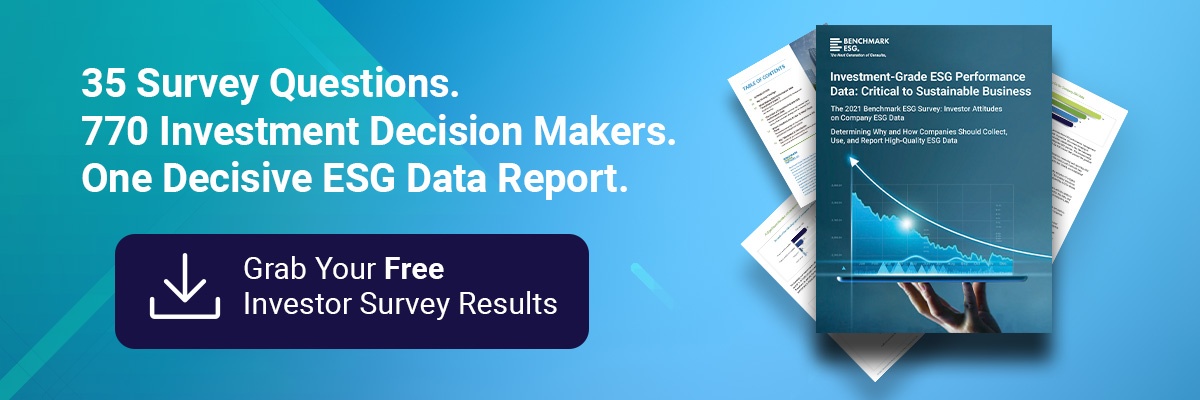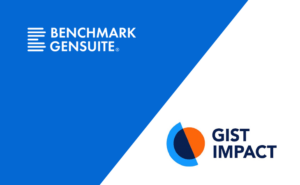Governance is a critical pillar of ESG initiatives, yet many organizations are left wondering what exactly the “G” stands for and how to incorporate it into their strategies. Governance covers a wide variety of subjects including corporate leadership, codes of conduct, enterprise risk management, supply chain management, tax strategy, materiality, policy making, and more. Managing these myriad of responsibilities requires organizational capabilities that surpass traditional approaches to launching program initiatives and delivering reports.
During the Governance Best Practices and Learning Session held in Orlando earlier this year at the 2022 Benchmark Gensuite® Impact Conference, governance management trends and solutions were discussed at length–let’s take a closer look into some highlights and key themes from this interactive breakout session.
Get Free Access to “Best Practices & Learning Sessions: Governance” Now
Governance Best Practices
Kevin O’Neill, Sr. Manager, Strategic Product Management at Benchmark Gensuite® and Minahil Choudry, ESG Reporting Specialist at Sustainable Business Consulting (SBC), began the session by leading a conversation on Governance best practices. SBC delivers solutions that address the world’s most pressing social and environmental issues by transforming the way businesses operate, focusing on three areas along the sustainability journey: climate and greenhouse gas strategy, ESG strategy and goals, and ESG reporting.
Both emphasized that effective corporate leadership and efficient software systems are necessary for an organization to implement and practice governance strategies that will stand the test of time.
One major metric driving how a company’s governance strategy is measured pertains to how well the executive team is incentivized to manage said ESG program. Many investors look at governance factors first, as they set the stage for which values companies will prioritize in regards to their ESG goals. This encourages leaders overseeing their organization’s governance initiatives to place a more significant priority on those goals, ensuring there’s a higher likelihood of achieving them. Another way to incentivize executives to act on ESG goals is through compensation. Looking at the data, long and short term objectives tied to executive compensation have risen, compared to the past when executive compensation was more closely tied to quarterly earnings. Benchmark Gensuite® and SBC advise companies to challenge executives with achievable, short-term goals around topics like human capital management. Long-term goals will be geared towards emissions reduction overall, which requires years of commitment.
“You can’t just say net zero and say, cut a few emissions here, but then ultimately, 2049, we’ll just rely on a huge amount of unproven technology to help us get there; there needs to be shorter milestones that need to be tracked and managed to help you guide ESG strategies,” explained Kevin O’Neill while sharing about the role executive compensation incentives play in setting ESG targets.
Governance disclosures are more subjective in nature. It is critical to following best practices and making sure that your company is disclosing data that gives external stakeholders and internal stakeholders confidence . To deliver high quality data, programs must be managed appropriately. Enter Benchmark Gensuite®’s functionality within the ESG Disclosure Director platform that provides some of these disclosure responses, and allows leaders to manage how goals are set over the years, all while accurately tracking progress.
Governance also covers risk and supply chain management. Benchmark Gensuite®’s software solutions provide valuable insights into product regulatory updates and potential supply chain risks. Especially for companies that have thousands of suppliers, it can be difficult to operate through PDF responses given the number of manual entry issues. Facilitating supply chain management with a digital solution is a key step in managing suppliers.

Materiality Assessment
Minahil Choudry continued the conversation, focusing on the role corporate leaders play when performing materiality assessments. Materiality assessments enable companies to identify which disclosures are relevant to their business. To compile these assessments, companies rely on investor and stakeholder perspectives to inform and enhance their corporate strategy. This process helps mitigate long term risk all while fostering relationships with important stakeholders through community engagement efforts.
Double materiality refers to companies’ reports on both financially material topics and topics material to the economy, environment, and people. This helps identify and prioritize ESG issues that are the most critical to an organization. In the past, financial materiality was prioritized;now, double materiality is becoming a common standard when supervising an ESG program. Collecting qualitative and quantitative data is the best method of putting together a materiality assessment. Benchmark Gensuite® provides a Materiality Assessment tool to help to conduct assessments effectively throughout companies no matter the size.
Companies often have difficulty identifying which disclosures to report on after a materiality assessment, which can cause friction amongst leadership teams. This friction is aided by the fact that at this time there is no definite standard on what data companies should be including in disclosures. In 2023, The Global Reporting Initiative is expected to release sector-specific standards. Ideally, material topics will be decided for companies, helping to inform and reduce that friction at the final decision stage.
“Double materiality can also help you mitigate long term risks so you can get ahead of mumblings that might be happening across your stakeholders, so you are aware of the attitudes towards your company, and it can alert you of things that might be coming down the pipeline. So it’s very helpful that way,” Minahil said while explaining the purpose of double materiality.
Trends in Governance
Governance covers a broad range of topics and preparing your organization for upcoming compliance changes in the ESG arena can be difficult. Avoiding regulatory intervention can be a massive task, and prove to be costly if not given the adequate support. Regulatory interventions include anticompetitive behavior, tax, strategy, and policy influence. These all play a role in meeting local compliance standards for organizations. Benchmark Gensuite® supports companies with governance management by providing Natural Language Processing tools to search for potential controversies. Software such as NLP help govern risk and mitigate controversies for companies.
Risks such as cybersecurity and privacy concerns are prevalent amongst investors as companies prepare for the digitized age of data collection. The SEC proposed companies report about material cybersecurity incidents and periodic reporting. Companies should disclose a robust business continuity plan and plan for disclosure to stakeholders around possible cybersecurity attacks and data privacy concerns. Demand for board member expertise and oversight in cybersecurity is increasing overall.
Diversity, equity, and inclusion (DEI) has also been a rising topic in ESG since 2020. Not all companies put a lot of investment and effort into the subject, but investors pay attention to the value creation and business strategy that comes along with implementing DEI into a business model. Having a diverse leadership team can protect organizations from controversy while also adding value to the perspective of the company overall to create value. Companies that are best in class have a well-defined DEI statement supported by executive compensation incentives to make sure those statements translate into action. Employees will recognize your community engagement, as you not only state but execute your DEI commitments.
Operational Risk Assessment Solutions
Benchmark Gensuite®’s Auditing & Compliance Assurance solutions support companies as they perform risk assessments associated with governance, offering a comprehensive, real-time approach to systemic risk assessment, program auditing, and evaluation with embedded reporting and data analytics. Additionally, other Benchmark modules including Risk Registry and Management Systems Scorecard extract collected data after the assessment has been conducted, make sense of the results, and establish a plan for corrective and preventative actions if needed.
Benchmark Gensuite® helps manage the entire audit lifecycle and assess site compliance against standardized regulatory checklists in Reg Auditor, allowing users to create inspection checklists customized to each site’s program or process and drive corrective actions using Inspection Tool & Forms. The software provides quick response time and effectively avoids compliance gaps through third-party content integration with Reg Tracker. Benchmark makes governance manageable, enabling auditors to utilize online or batch load capabilities for real-time observation, data collection, and collaborative consolidation in Audit Assistant.
Road Ahead
The “G” in ESG should not be forgotten. Governance plays a vital role in ESG program management and is necessary to meet rapidly changing global compliance requirements. Executive teams need to be prepared for the inevitable nuances that come along with managing governance factors. The first step should be embracing software solutions to keep up with duties such as operational risk assessments, trends in governance, and materiality assessments. Susan Boone, Benchmark Gensuite®’s Senior Director of Subscriber Services wrapped up the event describing the different software demands companies have to operate, as every organization has varying needs. Benchmark continues to offer a variety of solutions to make sure organizations bring their ESG strategy to life.
Discover the power behind the software solutions Benchmark offers with a free demo today.



